Panel 1
Marina Cerra, Paola Di Toppa, Daniele Montanaro
Italian national legislation on environmental damage, regulated in Part Six of Legislative Decree No. 152/2006 (transposing Directive 2004/35/EC on environmental liability), designates the Ministry of the Environment and Energy Security (MASE) as the sole competent authority for the prevention and remediation of environmental damage.
The Ministry operates through both judicial and administrative procedures, supported by the National Environmental Protection System (SNPA), which provides the necessary technical assistance.
In 2024, out of 455 reported criminal proceedings, the Ministry requested SNPA’s assistance in 67 cases to assess environmental damage. SNPA completed 64 technical-scientific assessments to support the Ministry’s decisions, including some cases from 2023 that were concluded in the following year.
The Ministry acted as a civil party in 6 cases, based on the technical reports provided by SNPA.
The National System for the Protection of the Environment (SNPA), as established by Law No. 132/2016, provides technical-scientific support to MASE in both criminal and administrative proceedings, where it is necessary to identify, describe, and quantify environmental damage for the protection of public interests, through the development of technical assessments.
The environmental damage action in criminal proceedings is initiated by MASE by activating SNPA to carry out technical assessments. Such action is taken for all criminal proceedings reported by the State Attorney's Offices which, due to the relevance of the offence, require technical-scientific support aimed at verifying the existence of potential environmental damage. If confirmed, MASE, upon authorization from the Presidency of the Council of Ministers, notifies the District Attorney’s Offices of its intention to join the proceedings as a civil party and to pursue compensation from the liable parties.
The indicator represents the number of technical assessments developed for the evaluation of environmental damage, reflecting the State’s action to address the environmental consequences of criminal offences. The data describe, in addition to the territorial distribution of the criminal proceedings reported by the District Attorney's Offices and those for which MASE acted as civil party, the detailed information on the cases subject to SNPA technical assessment.
Such data are organized on a regional basis (according to the competent Court) and provide information regarding the type of offences, and the category of sites/activities where the alleged facts took place, based on the classification in Annex 5 of Part Six of Legislative Decree No. 152/2006 (activities at risk of causing environmental damage).
To provide an overall framework of the actions promoted by the central Public Administration for initiating decision-making processes aimed at addressing environmental consequences resulting from offences charged in criminal proceedings at the national level.
- Directive 2004/35/EC on environmental liability with regard to the prevention and remedying of environmental damage
- Legislative Decree No. 152/2006, Part Six – Provisions on compensatory protection against environmental damage
- Law No. 132/2016 – Establishment of the national environmental protection system and regulation of ISPRA
Panel 2
Data quality assessment
- ISPRA
- MASE (Ministry of Environment and Energy Security)
Data derived from the database managed internally by ISPRA – Department for the Assessment, Evaluation, and Remediation of Environmental Damage, and from data provided directly by the national competent authority (MASE – Directorate General USSRI – Division IX – Environmental Damage) for the reference year.
National (I), Regional (R)
2017-2023
Indicator assessment
Starting from the assignments received by ISPRA from MASE, the content of criminal proceedings under preliminary investigation was analyzed within the framework of the environmental damage assessments carried out during the reference year. This analysis enabled the identification, across the national territory, of the percentage distribution of the reported illicit activities and of the most frequently involved site types in these proceedings.
In 2024, the SNPA carried out 64 assessment procedures at the request of MASE, representing approximately 14% of the 455 reports received by the Ministry from the State District Legal Offices (Table 1). Compared to the previous year, there was an increase of 3 percentage points in the proportion of assessed cases relative to the total reports submitted to MASE.
This increase confirms the State's ongoing commitment to actions aimed at safeguarding the environment (Figure 1).
Overall, based on data collected since 2017—the year in which SNPA was established—after a slightly negative trend observed up to 2020, a rising trend has been recorded in recent years (Figure 1).
Data
Table 1: Number of cases related to preliminary criminal proceedings
ISPRA processing based on ISPRA and MASE data
Table 2: Number (and percentage) of activity types listed in Annex 5, Part VI of Legislative Decree 152/2006 related to offenses in criminal proceedings assessed by SNPA in 2024
ISPRA processing based on ISPRA data
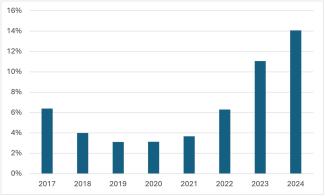
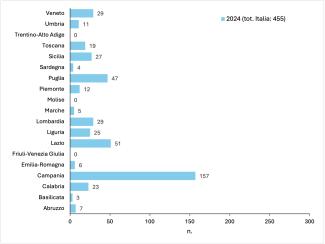
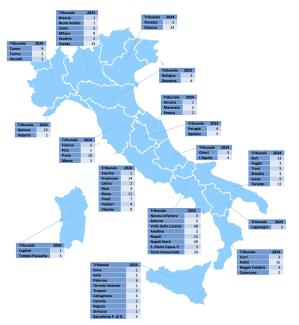
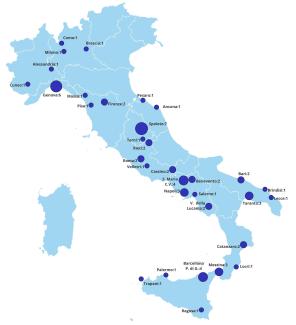
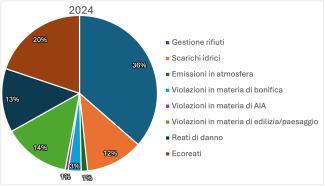
In 2024, MASE received 455 reports from the State District Legal Offices, in which the Ministry is listed among the injured parties in the initiating acts of criminal proceedings.
Overall, Campania is the region from which the highest number of reports originated (157), followed by Lazio and Puglia with 51 and 47 reports, respectively (Figure 2).
More specifically, the highest number of reported criminal proceedings came from the court district of North Naples (49 reports), followed by the courts of Vallo della Lucania (48 reports) and Torre Annunziata (24 reports) (Figure 3).
Following a preliminary screening based on the seriousness of the alleged offenses, MASE identified approximately 15% (67 cases) of the total reports as potentially meeting the requirements for initiating compensation actions.
For these cases, the Ministry commissioned SNPA to carry out technical-scientific assessments aimed at supporting decision-making on whether to seek civil damages for environmental harm.
As a result of these assignments, SNPA completed 64 technical assessments in 2024. According to data provided by MASE, these assessments led to the Ministry acting as a civil party in 6 cases (Table 1).
The competent courts for the 64 preliminary investigations were mainly located in the regions of Campania (12), Sicily (10), Umbria (8), Lazio (7), and Puglia (7) (Figure 4).
As shown in Figure 5, the offenses reported in the 64 criminal proceedings assessed by SNPA generally involved violations under Legislative Decree 152/2006, primarily concerning waste management (36% of the offenses recorded in 2024).
In addition, there were offenses under the Italian Criminal Code, including so-called "environmental crimes" ("ecoreati"), which represent one of the key indicators for identifying potential environmental impacts.
Among the cases for which SNPA was tasked by MASE to assess environmental damage, environmental crimes represented 20% of the offenses recorded in 2024.
Other relevant offenses included illegal discharges into water bodies (around 12% of the reported offenses) and violations related to building regulations and landscape protection (approximately 14%).
Criminal offenses under the Penal Code—such as contamination of water intended for human consumption, destruction of natural beauty, damage, forest fires, etc.—accounted for about 13% of the offenses in the proceedings under assessment.
The offenses in question relate to a wide range of activities. Among them, particular attention is given to those listed in Annex 5 of Part Six of Legislative Decree 152/2006. These activities are considered potential sources of environmental damage and are subject to a special liability regime with a reversal of the burden of proof.
In 35 of the 64 preliminary assessments carried out in 2024—around 55% of the cases—unlawful acts were linked to activities listed in Annex 5. In some of these 35 assessments, multiple Annex 5 activities were involved, totaling 40 identified activities, with a predominance of waste management and regulated wastewater discharges (Table 2).
The 6 criminal proceedings in which MASE acted as a civil party, based on the outcomes of the SNPA's assessments, relate to offenses that occurred in the regions of Sicily (2 cases), Calabria (2 cases), Piedmont, and Campania.